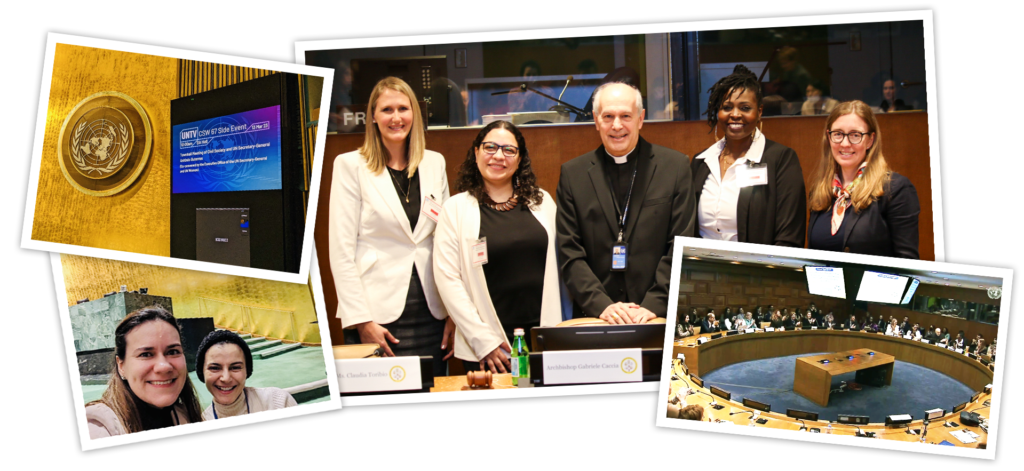Conversations about Women, Health, Education and Technology at the United Nations… with Human Dignity at the Center
On March 14th, the World Youth Alliance (WYA), the Holy See Mission and the FEMM Foundation organized a side event during the 67th Session of the Commission on the Status of Women (CSW67) entitled “Elevating the Standards for Women and Girls’ Healthcare Through Technology and Education.” This was in response to CSW67’s theme: “Innovation and technological change, and education in the digital age for achieving gender equality and the empowerment of all women and girls.”
Archbishop Gabriele Caccia, Apostolic Nuncio to the Holy See Mission to the United Nations, set the stage by calling for medicine and innovation to take women’s health needs seriously. “By embracing [a] woman in her fullness, medicine can also better service women through accurately diagnosing and treating problems which are both too common and sadly too often dismissed and left untreated. Technology and innovation offer tools to provide women and girls with better healthcare; healthcare which is tailored to them and meets their needs.” Anna Halpine, CEO of FEMM and the founder of WYA, proceeded to moderate the event.

The first speaker was Dr. Danielle Koestner, Chief Medical Officer of the FEMM Foundation. Dr. Koestner stressed the importance of looking at each woman’s unique fertility patterns, symptoms and medical history to identify real medical issues. She shared about her most recent work to incorporate FEMM protocols into hospitals in Tanzania. One doctor who was trained on this trip, Dr. Ramiya Sande, shared the impact of this training in her medical practice. She shared, “Before [my] introduction of the FEMM course I was treating the patient… without digging into the problem most of the time, but currently I am always digging to the problem and finding the cause and then am treating the patient.”
The next speaker, Claudia Toribio, highlighted the huge gaps that exist in women’s basic knowledge about their cycles. A FEMM instructor from the Dominican Republic, she sees that “[t]here is a general ignorance of how the cycle works and why it is important and this ignorance doesn’t just include women in delicate situations but it also includes many educated women, even professionals… I am grateful and privileged to have this information and that I can share it with them but there still is a long way to go; there’s women still to reach.”
Following Ms. Toribio’s intervention, the moderator emphasized that this need for health education also requires a basic knowledge and understanding of human dignity. Ms. Halpine introduced Zainab AlRamlawi, WYA Regional Director of the Middle East and North Africa, who is implementing WYA’s Human Dignity Curriculum (HDC) very successfully in a number of schools in her region. Next, another success story was presented by LaTisha Downing, principal of Central School in Kansas. Ms. Downing shared that, “…it is amazing that these [children] came to our building with tons of walls built up about education and about themselves but with the Human Dignity Curriculum they are learning to not only respect others but also to have amazing respect for themselves.” The program is going so well with the younger-aged children, that the curriculum will be used in the high school level as well.
In his closing statement, Archbishop Caccia stated that “not all the ways in which women are treated like objects are very obvious. Healthcare which disdains women’s unique capacities reduces women themselves to a problem to be managed…” These final words and the combined interventions of all the speakers successfully communicated that the essential knowledge of human dignity makes a difference in how people view themselves, how they seek care and how medical providers view their patients and advocate for their needs. Over 100 people attended WYA’s side event in person with many more joining via livestream.
CSW67 took place from March 6-17. WYA was actively involved by attending official meetings, other side events, and networking with country representatives and ministers. WYA submitted a written statement to CSW, which can be read here. We also submitted an oral statement, but unfortunately it was not selected to be delivered live. Finally, our staff followed the negotiations of the draft Agreed Conclusions, which ended in the early hours of March 18th. We shared our comments and recommendations with over 59 UN member states.
Want to bring the Human Dignity Curriculum to your community? Check out humandignitycurriculum.org to view sample curricula and read about successful implementations around the world.
FEMM has health information that is relevant for everyone. Consider reading more, downloading the app, joining a course, or finding a doctor at femmhealth.org.







